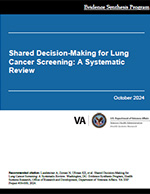
|
Recommended citation: |
Download PDF: Complete Report, Executive Summary, Report, Appendices
Evidence on lung cancer screening (LCS) shared decision making (SDM) communication strategies and tools varied across settings/encounters, approaches, and individuals. While most studies reported on knowledge, few addressed receipt of initial or adherence to follow-up LCS, concordance of decision with values, decisional conflict/regret, distress/anxiety, or information quality. Research is needed to enhance LCS SDM, including: identifying accurate, efficient, and effective SDM tools adaptable to settings and patients and reducing barriers to appropriate LCS and follow-up.
Over 230,000 new cases of lung and bronchus cancer will be diagnosed in the US in 2024 and 125,070 deaths attributed to lung cancer. LCS reduces lung cancer mortality through early detection and treatment, however it requires adherence to repeated screenings and follow-up evaluations. SDM is meant to help patients understand benefits and harms, incorporate their preferences and values and make an informed decision whether LCS is right for them. To support the VA National Center for Lung Cancer Screening (NCLCS) policies on LCS SDM, we conducted an evidence review on SDM tools and processes effects.
Based on 39 randomized trials and observational studies, SDM (that may include care coordinators or patient navigators) may increase LCS participation, have acceptable information quality, and do not increase decisional conflict/regret. A decision aid may be superior to an educational tool, and the choice of decision aid may not impact LCS. Studies did not report on smoking behaviors; harms; resource allocation/usage; cost or cost effectiveness. Barriers to LCS SDM included: resource availability, patient's reticence and lack of engagement with, and negative response to, SDM. Facilitators included use of a decision aid during the SDM encounter, a culture receptive to SDM, resources, prioritization among other clinic demands, and innovation among deliverers and recipients. Research is needed to enhance SDM and appropriate LCS implementation.